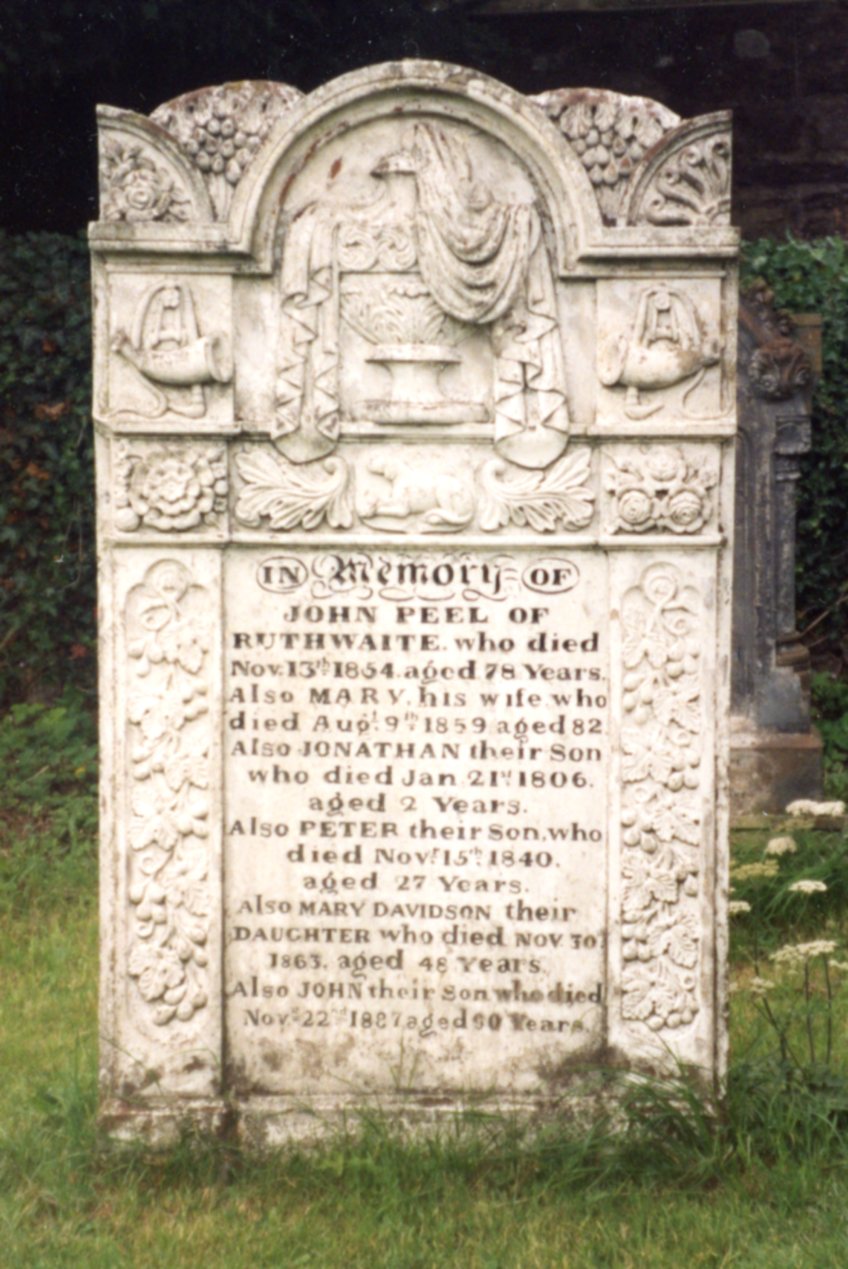 |
| Have you seen this man? Now he has gone far, away; |
Some of you may have noticed a gentleman farmer guy named John Peel poking out at you in different parts of the Wake and this happens as a leitmotif throughout the book. So why would this guy riding to hounds show up over and over again?
And he's clearly dead. Why wake him up?
"Peel was born at Park End, near Caldbeck, Cumberland; ...He was baptised on 24 September 1777, ...Peel married in 1797 to Mary White [whose] family's property at Ruthwaite (near Ireby) passed into his hands, which secured Peel a comfortable income.
However, he was, ... prone to dissipation and he devoted himself primarily to hunting. Peel was a farmer by profession, and kept a pack of fox hounds...By the end of his life (13 November 1854, most likely due to a fall while hunting) he had accrued large debts, which his friends helped him pay off.[1]...
Peel became a moderately well-known figure, owing to the song written about him. ... He died in 1854 and is buried in the churchyard of St Kentigern's Church, Caldbeck.[2]
In 1977 his grave was vandalised by anti-hunting activists."
--Wikipedia [emphasis mine]
As well as an almost a Caldbeckian version of Tim Finnegan, Peel seems to me to be a herald of the morning. This morning can be thought of multivariately as we Wakeans are wont to do, as the waking of the dead, the waking of the sleeper, the renewal of the cycle of eternal return, the waking of day, and the waking to a new consciousness, to a new heaven and new earth.
So let's listen to the song of John Peel and note the Wakean themes:
D'ye ken John Peel with his coat so gay?
D'ye ken John Peel at the break o' day?
D'ye ken John Peel when he's far, far a-way.
With his hounds and his horn in the morning?
Chorus
For the sound of his horn brought me from my bed,
And the cry of his hounds which he oftime led,
Peel's "View, Halloo!" could awaken the dead,
Or the fox from his lair in the morning.
Note a variant reading of "grey" for "gay" in some versions of the poem. Some other variations are:
Yes, I ken John Peel and his Ruby, too!
Ranter and Ringwood, Bellman so true!
From a find to a check, from a check to a view,
From a view to a kill in the morning.
For the sound of his horn, etc.
Then here's to John Peel with my heart and soul
Let's drink to his health, let's finish the bowl,
We'll follow John Peel through fair and through foul
If we want a good hunt in the morning.
D'ye ken John Peel with his coat so gay?
He liv'd at Troutbeck once on a day;
Now he has gone far, away;
We shall ne'er hear his voice in the morning.
For the sound of his horn, etc.
Or--
D'ye ken John Peel with his coat so gay?
He liv'd at Troutbeck once on a day;
Now he has gone far, away;
We shall ne'er hear his voice in the morning.
For the sound of his horn, etc.
Or--
...Ranter and Ringwood and Bellman and True,
Or--...
From a view to a death in the morning
... and many more...
You will hear echoes of John Peel and his hounds innumerable times in the Wake.
For example early on, he gallops up: "For he kinned Jom Pill with his court so gray and his haunts in his house in the mourning. " (31.28-33).
And even the "far, far" is subtly evoked in the recorso in the last page in the phrase "Far calls. Coming, far!"
References:
John Peel:
http://en.wikipedia.org/wiki/John_Peel_(huntsman)
Yet more variations:
http://home.mweb.co.za/sa/salbu/JohnPeel.html
From a view to a death in the morning
... and many more...
You will hear echoes of John Peel and his hounds innumerable times in the Wake.
 |
| John Peel Farm Cottage |
And even the "far, far" is subtly evoked in the recorso in the last page in the phrase "Far calls. Coming, far!"
References:
John Peel:
http://en.wikipedia.org/wiki/John_Peel_(huntsman)
Yet more variations:
http://home.mweb.co.za/sa/salbu/JohnPeel.html


